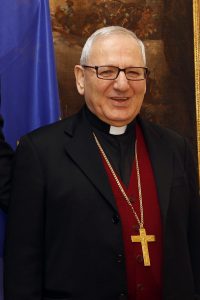Reprinted via translation from the Nahrain Post:
Baghdad, Iraq — Tuesday, Sept, 6, 2016 A. D.: His Eminence Louis Raphael I Sako, the Catholic Chaldean Patriarch of Baghdad demanded “Self-management and International protection of the Country of the Nineveh Plains after its liberation, to ensure the return of the diaspora, and to rebuilt it.” The Patriarch said Tuesday that, first, providing for the international defense of Christianity in the towns of the Nineveh Plains after its liberation from ISIS, and their self-governance will represent a solution to recompense the Christians with their own country and to facilitate its reconstruction and provide a firm future foundation for it.”
The Patriarch, explained in his article, which comes under the heading “insights about Mosul and towns in Nineveh Plains after liberation “, that ” the requirements for the return of Christians and reconstruction is to provide an international force (e.g. such as the United Nations or the USA) to protect these areas after their liberation from the organization of the Islamic State, and maybe at this stage, the solution is to establish the self-governance of Christian towns Nineveh Plains “.
The Patriarch called at the same time “for the award of freedom for the inhabitants of these towns through a free and fair referendum about choosing their future, whether to be part of a federal State of Iraq or of the Kurdistan Province or to be recognized as the territory of Nineveh”.
And according to his article “in planning for the future of Mosul and towns in Nineveh Plains, one must focus on the situation of the Christians and minorities, who were subjected to persecution and semi-genocide “, so that when “free it might give a glimmer of Hope in the return of their children to their homes, because they need some time to build confidence with their neighbors, and to provide proper protection of themselves, and they will continue to bleed as a people so long as they have need to migrate to safer zones in such a dangerous way. “
And Patriarch Sako also fears what he described as a “new recipe for arranging the political situation in Iraq, which may not include Christians and minorities to ensure their survival and the safety of their existence or their future “, stating that ” the opportunity is now for the global community to show compassion for them on account of their suffering, but most of all to preserve their unity, and re-organize and support them, and that there is a necessity of renouncing the differences that affect the future of their presence in the country, being that there are not many parties who take their side “.
In addition, regarding the concerns and challenges that his land will suffer after the liberation, Patriarch Sako said ” the absence of a unified vision between the political parties in the management of the plan for security and the political and administrative management, is what is creating fear of imposing it de facto by the parties involved in the process of liberation “, pointing out that ” all sides sought to draw a map of the future territorial boarders before the actual liberation begins “.
The Patriarch also calls for a ” State of emergency in the city of Mosul and in the Nineveh Plains, and the appointment of civilian governors who profess an openness, moderation and peacefulness, and he calls for an emphasis on the role of the media to oppose self-interest and extremism and hatred and for the dissemination of a culture of Openness and tolerance and brotherhood and acceptance of one other. Respecting and promoting a peaceful coexistence, stability and cooperation, and the establishment of a fund for the reconstruction and development plans to rebuild the area, moreover, after its liberation will gives people hope to return and seek a future “.
And Patriarch Sako noted that a “military victory against the jihad of ISIS doesn’t mean that the solution to the problem has arrived or that the wider-spread extremism has been defeated “.
He also called upon the leaders of Iraq to ” deal decisively and respond with solutions to the conflicts on leadership and the reconquest and property disputes, where ISIS took people’s houses and their return to the rightful owners is not easy, because it’s important to protect the people and their property.”
He made his comments on the Nineveh Plain Territory so that “unlike Anbar Salah ad din Province, owing to its combination of the diverse population, lest there return a storm of conflicts, The Nineveh Plains Territory may be stronger than before, after it has recovered from ” ISIS”. For this it needs a firm management and one open to this reality, which employs the wisdom of justice “.
© 2016, Ordo Militaris Inc.. All rights reserved. Certain incorporated images are public domain.

